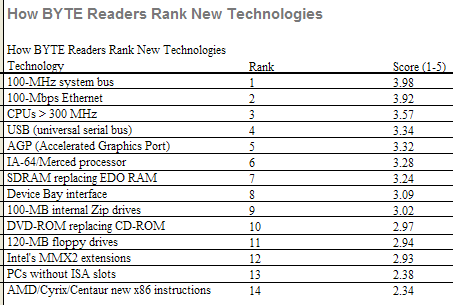| Rapid obsolescence is forcing BYTE readers to replace
their home and office PCs more often. Readers are also
sharply divided on the question of proprietary CPU
interfaces and are more likely to buy or recommend a
non-Intel processor for home use than for office use. Those are just a few of the conclusions we reached from a telephone survey that gauges how 115 BYTE readers perceive current changes in the PC market. BYTE's research department conducted the survey in November by randomly calling readers from the magazine's subscription list. We wanted to determine how readers are coping with rapid obsolescence. Not surprisingly, 84 percent told us they're replacing their office PCs more often, and 66 percent said they're replacing their home computers more often. The largest number of readers — 43 percent — say they keep their office PCs for three to four years. About 25 percent get only two to three years out of a PC at the office, and 13 percent get less than two years. All together, 81 percent of our readers' office PCs are obsolete within four years. At home, readers tend to keep their PCs a bit longer before considering them obsolete. Again, the largest number — 39 percent — say they keep a home PC for three to four years. About 10 percent get two to three years out of a machine; 16 percent get less than two years. All together, 64 percent of their home PCs are obsolete within four years. About 40 percent of the readers said they upgrade a machine as much as possible before replacing it, while about 58 percent said they buy a whole new computer. We also asked what readers think about PC motherboards that have nonproprietary CPU interfaces — in other words, motherboards that can accept a CPU chip from any vendor, as Socket 7 motherboards can. The answers were remarkably distributed. For office PCs, 34 percent answered that open interfaces are "very important," 33 percent answered "somewhat important," and 31 percent answered "not at all important." For home PCs, 35 percent answered "very important," 32 percent answered "somewhat important," and 32 percent answered "not at all important." The results show that two-thirds of the readers think open CPU interfaces are somewhat important, but it's not a black-or-white issue. Another question measured how many readers would buy or recommend a PC with a non-Intel x86-compatible processor. For office PCs, 17 percent said they would be "very likely" to buy or recommend such a system. Another 43 percent answered "somewhat likely," while a significant 41 percent said "not at all likely." For home PCs, readers were a little more open to the idea: 27 percent answered "very likely," 33 percent said "somewhat likely," and 38 percent answered "not at all likely." Interestingly, the three major vendors of non-Intel x86 chips — AMD, Cyrix, and Centaur — together command only about 10 percent of the market. We asked readers to assess the importance of 14 new or emerging technologies. Because these technologies are major factors in the accelerating obsolescence of PCs, the answers give some indication how readers will determine when their systems become obsolete. We asked readers to judge the technologies on a scale of 1 to 5 ("not very important" to "very important"). The results suggest that readers are more concerned about system performance than local storage capacity. Convenience, represented by USB, also did well. How BYTE Readers Rank New Technologies

Copyright 1994-1998 BYTE |